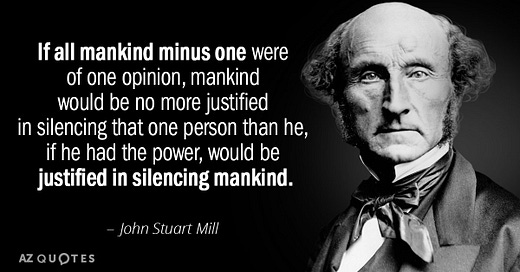Last week I recommended reading John Stuart Mill, On Liberty, chapter 2, especially the concluding section on the “third possibility” regarding received and opposing opinions, being the “commoner case when the conflicting doctrines, instead of being one true and the other false, share the truth between them: and the nonconforming opinion is needed to supply the remainder of the truth, of which the received doctrine embodies only a part.”
A bit later in the section, Mill turns to politics. His argument is worth hearing in whole, given our upcoming election year. Note the opposed pairs of partial truths.
In politics, again, it is almost a commonplace, that a party of order or stability, and a party of progress or reform, are both necessary elements of a healthy state of political life; until the one or the other shall have so enlarged its mental grasp as to be a party equally of order and of progress, knowing and distinguishing what is fit to be preserved from what ought to be swept away. Each of these modes of thinking derives its utility from the deficiencies of the other; but it is in a great measure the opposition of the other that keeps each within the limits of reason and sanity.
Unless opinions favourable to democracy and to aristocracy, to property and to equality, to co-operation and to competition, to luxury and to abstinence, to sociality and individuality, to liberty and discipline, and all the other standing antagonisms of practical life, are expressed with equal freedom, and enforced and defended with equal talent and energy, there is no chance of both elements obtaining their due; one scale is sure to go up, and the other down.
Truth, in the great practical concerns of life, is so much a question of the reconciling and combining of opposites, that very few have minds sufficiently capacious and impartial to make the adjustment with an approach to correctness, and it has to be made by the rough process of a struggle between combatants fighting under hostile banners. On any of the great open questions just enumerated, if either of the two opinions has a better claim than the other, not merely to be tolerated, but to be encouraged and countenanced, it is the one which happens at the particular time and place to be in a minority. That is the opinion which, for the time being, represents the neglected interests, the side of human well-being which is in danger of obtaining less than its share.
I am aware that there is not, in this country, any intolerance of differences of opinion on most of these topics. They are adduced to show, by admitted and multiplied examples, the universality of the fact, that only through diversity of opinion is there, in the existing state of human intellect, a chance of fair play to all sides of the truth.
When there are persons to be found, who form an exception to the apparent unanimity of the world on any subject, even if the world is in the right, it is always probable that dissentients have something worth hearing to say for themselves, and that truth would lose something by their silence.
(Source: from On Liberty, chapter 2, “Of Thought and Discussion”; I’ve added extra paragraph divides and emphasis.)
I particularly appreciate his admonishment to champion the underdog, the minority point of view, the neglected interest, the exception to apparent unanimity, with whom we disagree (italics). What an amazing year we could have in 2024 were we all to do this!
For quick reference, here is Mill’s list of opposing pairs of partial truths. When you find yourself aligning strongly toward one, try defending the other. 😎
order & stability ~~ progress & reform
democracy ~~ aristocracy
property ~~ equality
co-operation ~~ competition
luxury ~~ abstinence
sociality ~~ individuality
liberty ~~ discipline
May we all find verity in the proper balance of each.




